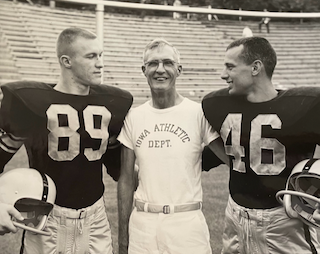
Iowa athletic trainer Doyle “Doc” Allsup (center) flanked by Hawkeyes Don Norton (No. 89) and Ray Jauch (No. 46) in 1958 or 1959.
Jan/Feb 2024 (Volume 16, Issue 1)
By Mark Petersen
While today’s University of Iowa student-athletes reap benefits from the modernization of sports training, one man was largely responsible for keeping Hawkeyes in the arena of competition with little more than tape, elbow grease and a “can-do” attitude. His name? Doyle “Doc” Allsup. He served as the first full-time athletic trainer at the State University of Iowa (University of Iowa) in Iowa City from 1939 to 1960.
Known as “Doc” or “The Thin Man” by those who worked with him, the lanky Allsup weighed — at most — 130 pounds and stood nearly six feet tall. But he was considered by coaches and players a man of solid judgement and his work carried weight.
Allsup was born on April 14, 1902, in Delta, located in Keokuk County. He was the son of Albert and Margaret (Utterback) Allsup. When he was a young child his family moved to Oskaloosa, where he grew up and graduated from high school.
In 1928, Allsup married Gladys McCabe. The couple had four children; Bruce, Gerald, Darlene and James. They lived in Iowa City and “Doc” was devoted to his family and his work at Iowa, starting in 1937.
Though Allsup assisted a variety of athletes at Iowa, he is best known for his work with its football teams, most notably the “Ironmen” in 1939 and the Rose Bowl champions in the late 1950s.
Allsup and the ‘Ironmen’
Allsup’s career as an athletic trainer at Iowa began in 1939 working with the Hawkeyes football team which would finish ninth in the final Associated Press poll and compile a record of 6-1-1, including a thrilling victory over previously undefeated Notre Dame, 7-6. The team was coached by Eddie Anderson, who was hired to improve the program after the Hawkeyes managed to win only 22 of its 50 games from 1930 to 1938. He would be named AFCA Coach of the Year that season. On the field it was led by star halfback Nile Kinnick, who at the end of the season would be named a consensus first team All-American, earn Big Ten Player MVP honors and become the only Hawkeye to win the Heisman Trophy.
Out of the spotlight, but vital to the team’s success in 1939, was Allsup. He was 37 years old when he took the job after working for two years in Iowa’s athletic equipment room. The 1939 team became known as the “Ironmen,” a tribute to their physical stamina. It was Allsup who cared for those legendary figures of Iowa’s football history.
In the first game of the 1939 season, Kinnick scored three touchdowns and led Iowa to a 41-0 thumping of South Dakota. It would be the first of many games and other Hawkeyes sporting events in which Allsup would care for the health of Iowa’s athletes during his 22 years as a trainer including football, basketball, wrestling, swimming, gymnastics and track (indoor and outdoor). For many years he was the only staff member. Later, Dr. W.D. Paul would join the team as the second medical staff personnel. Under Allsup, Iowa had one of the lowest injury records in the Big Ten Conference. In his spare time, he would stencil new gear and repair old gear.
“My main job, really, is to tape injuries and to prevent further injuries by taping,” Allsup once told the Daily Iowan.
Allsup’s nickname, “Doc,” as one sportswriter said, “actually fits Doyle better than does the title ‘trainer,’ because he does little training. That is the coaches’ department. Doc is mainly interested in keeping his boys from getting hurt.”
“Before every practice session we tape nearly all the boys’ ankles, and before every game we tape them all,” Allsup said. “That’s a lot of tape.”
TO READ THE ENTIRE STORY AND OTHER FASCINATING STORIES ABOUT IOWA HISTORY, subscribe to Iowa History Journal.
